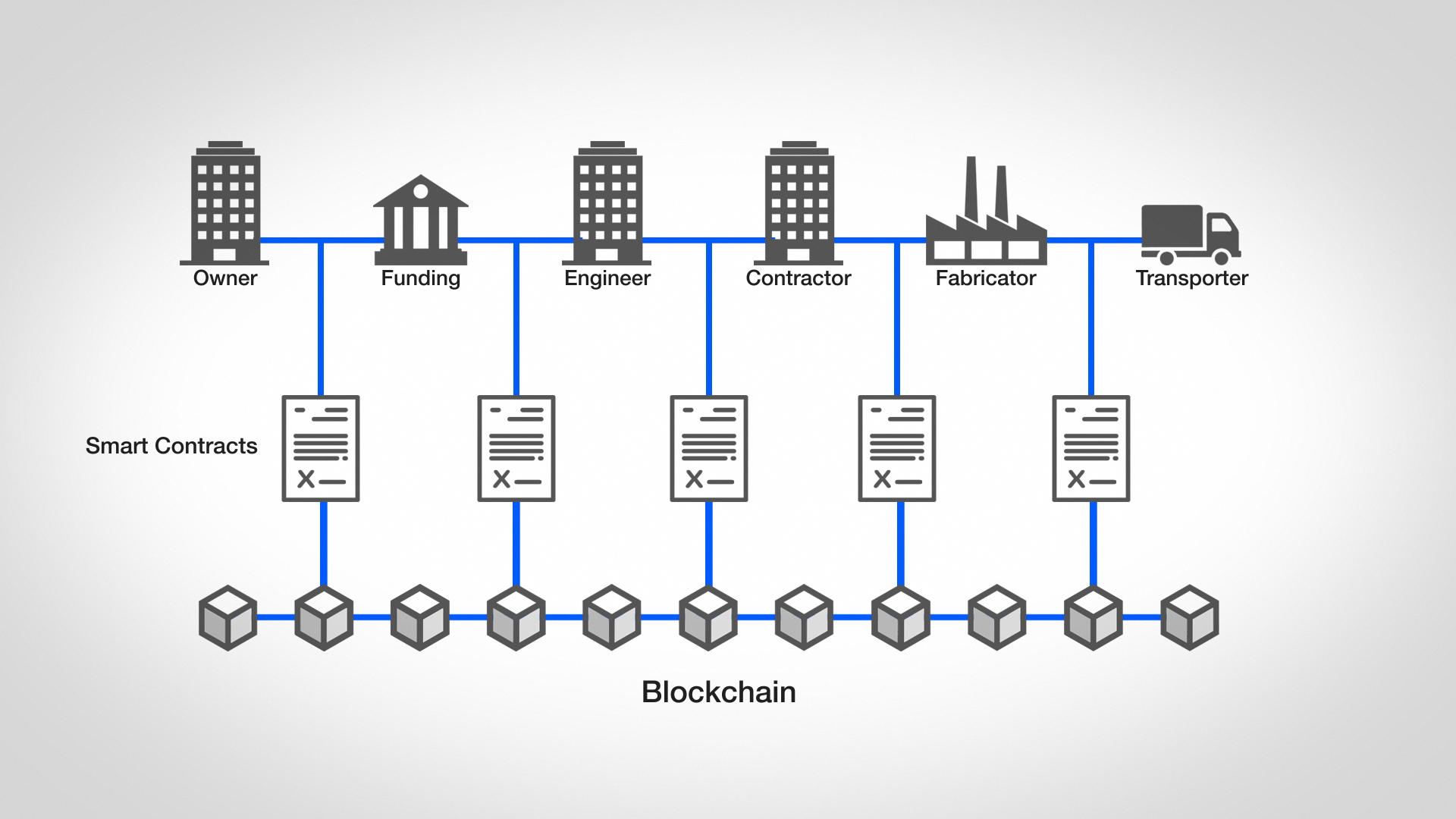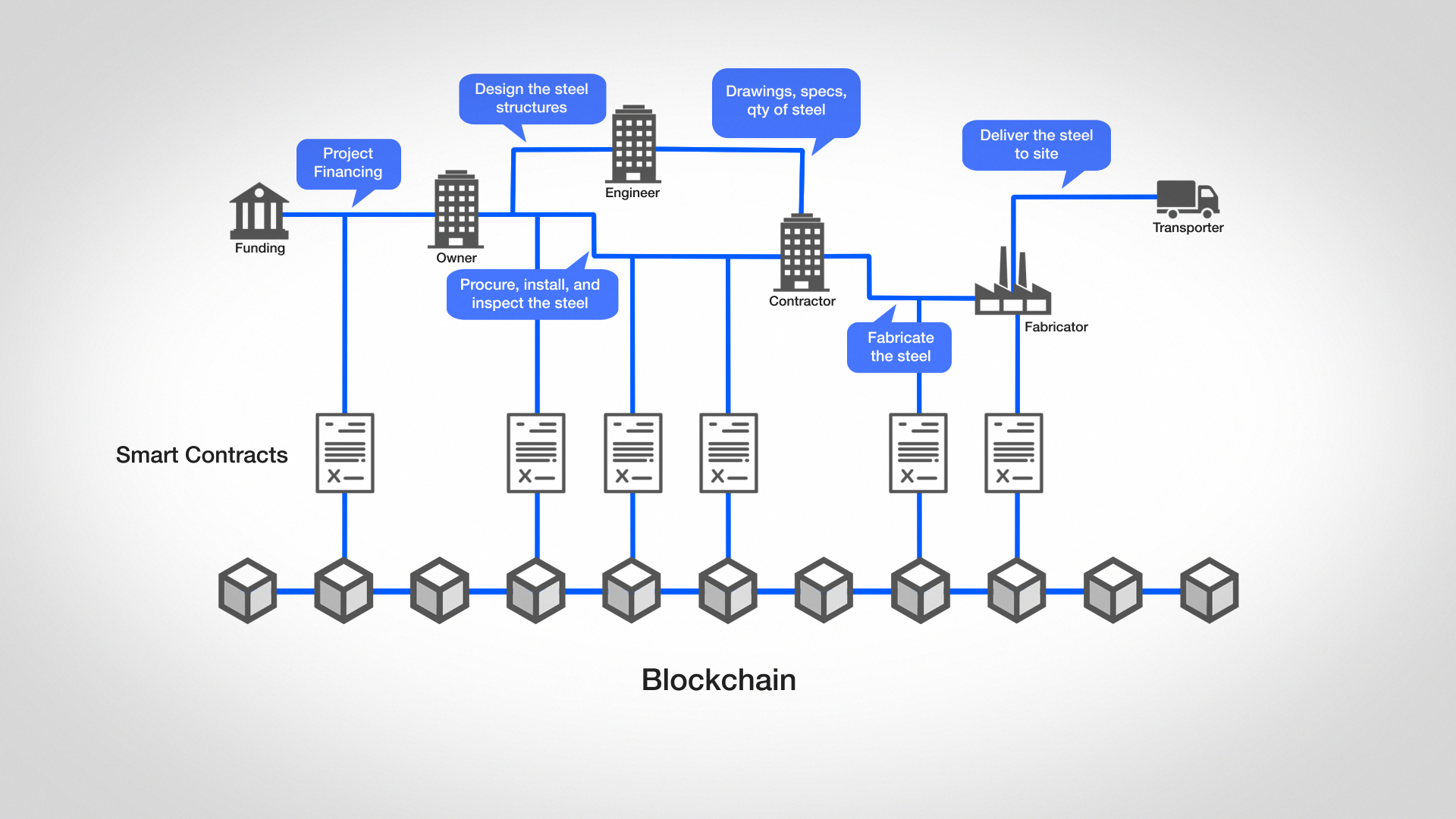
Can Blockchain Fix The Construction Industry’s Productivity Problem?
VP, Enstoa
In construction, value is created by funding and completing the right projects safely and efficiently. Delivering projects faster and at lower cost produces higher returns.
Unfortunately, the construction industry lags behind other industries in ways that hurt those returns. The global economy, for instance, has improved productivity at over twice the rate of the construction industry. Manufacturing boasts a productivity improvement rate over three times as high.
For the construction industry, this ongoing productivity problem means that $1.6 trillion of value is being destroyed each year. Organizations are paying too much for their built assets. How did we get here?
Thirty years ago, new management systems like Total Quality Management and Six Sigma were being adapted to the construction industry with hopes they’d deliver the same breakthrough efficiencies they had in manufacturing.
A wave of technology promised similar gains. Enterprise Resource Planning (ERP) systems and automated workflows entered design and construction, followed by 3D CAD, Building Information Modeling (BIM) systems, and Enterprise Asset Management (EAM) systems. Most recently, Internet of Things (IoT) with RFID tech has been the focus, as well as drone, scanning, and imaging solutions.
All these changes, however, have created only modest productivity improvements in projects. The amount of data captured has definitely increased exponentially, but as a whole, the construction industry is just keeping pace with inflation. Why?
The Role of Trust Between Stakeholders
One continued drag on efficiency in construction is a chronic lack of trust between stakeholders. Design and construction projects tend to be much bigger and more expensive than other projects, so they contain a lot of inherent fear and risk. Stakeholders often try to mitigate that risk through use of contracts and data hoarding.
These self-imposed barriers act like the wall and moat around a castle. Everything must pass through a drawbridge to get in or out. All of this slows down design and construction and puts an overall drag on productivity. Legacy systems create additional obstacles.
How Blockchain and Smart Contracts Can Build Trust
There’s a lot of buzz about blockchain and smart contracts these days and for good reason. Blockchains are not only faster and more secure than traditional systems, they’re also more cost effective, which is why so many banks and governments are turning to them.
Blockchain is a shared, decentralized system that exists between all the organizations involved in a project. It empowers companies to do business with one another more easily using shared business processes encoded within a common platform. This ecosystem-based approach lets organizations buy, track, and pay for goods and services much more quickly and effectively.
On a construction project, for instance, there are a usually a wide variety of companies involved. Typically, you have to wait to get contracts from all these companies as well as change orders and addendums as deliverables are added or changed. You have to pay all the companies involved and wait for their status reports.
With blockchain and smart contracts, by contrast, a centralized tracking system is first created. The companies involved define the rules, deadlines, and penalties around the project to start (that’s the smart contract part), then the blockchain automatically enforces these obligations as the project progresses. Was the steel delivered late to a project site? The blockchain automatically records that and, if desired, can automatically collect a late fee via cryptocurrency.

Blockchain also holds the potential of radically improving the global construction supply chain. Blockchains automatically capture where project assets are at any point in time. They identify who has custody and what state the asset is in. The steel that moves through a construction supply chain, for instance, is tracked and controlled in a detailed, automated way.
All this data is captured in the peer-to-peer network where transactions are stored and the relevant information is available to all stakeholders. Blockchains create an unbroken chain of trust between all key stakeholders and liberate projects from being document-driven to being data driven.

The benefits of this kind of visibility accrue up and down the construction supply chain. Dispute resolution becomes faster. Inventory management is streamlined and it’s possible to order and receive goods only as they are needed (aka “just-in-time planning”), which dramatically reduces waste. All of this adds up to lowered costs and accelerated schedules, construction’s two biggest drivers of value.
Could blockchain and smart contracts create the productivity breakthroughs the construction industry has been chasing for three decades? It’s too soon in the innovation adoption curve to know, but the future looks bright.
Suggested Next Steps
Organizations that are interested in the possibility of introducing blockchain and smart contracts should explore the following questions:
- How many of your existing vendors already use blockchains and smart contracts?
- Is your organization competing on supply chain and/or new building to such a degree that introducing blockchain and smart contracts could hold benefits? Are the potential gains of using this technology significant enough that they could merit seeking out vendors already using it?
- Are there any unique problems your organization is trying to solve that could be a good candidate for testing out blockchain and smart contracts?
- Are any of your capital projects large enough that they might inspire your existing vendors not yet using this tech to adopt it?
- How many processes and functions in your organization exist only to certify trust or facilitate workflow? Could blockchain increase your organization’s productivity not just at a project level but a structural one as well?
Get access to "Can Blockchain Fix The Construction Industry’s Productivity Problem?" whitepaper here.
Questions about using blockchain/smart contracts in your construction projects? Get in touch with us to speak to one of our experts.
In construction, value is created by funding and completing the right projects safely and efficiently. Delivering projects faster and at lower cost produces higher returns.
Unfortunately, the construction industry lags behind other industries in ways that hurt those returns. The global economy, for instance, has improved productivity at over twice the rate of the construction industry. Manufacturing boasts a productivity improvement rate over three times as high.
For the construction industry, this ongoing productivity problem means that $1.6 trillion of value is being destroyed each year. Organizations are paying too much for their built assets. How did we get here?
Thirty years ago, new management systems like Total Quality Management and Six Sigma were being adapted to the construction industry with hopes they’d deliver the same breakthrough efficiencies they had in manufacturing.
A wave of technology promised similar gains. Enterprise Resource Planning (ERP) systems and automated workflows entered design and construction, followed by 3D CAD, Building Information Modeling (BIM) systems, and Enterprise Asset Management (EAM) systems. Most recently, Internet of Things (IoT) with RFID tech has been the focus, as well as drone, scanning, and imaging solutions.
All these changes, however, have created only modest productivity improvements in projects. The amount of data captured has definitely increased exponentially, but as a whole, the construction industry is just keeping pace with inflation. Why?
The Role of Trust Between Stakeholders
One continued drag on efficiency in construction is a chronic lack of trust between stakeholders. Design and construction projects tend to be much bigger and more expensive than other projects, so they contain a lot of inherent fear and risk. Stakeholders often try to mitigate that risk through use of contracts and data hoarding.
These self-imposed barriers act like the wall and moat around a castle. Everything must pass through a drawbridge to get in or out. All of this slows down design and construction and puts an overall drag on productivity. Legacy systems create additional obstacles.
How Blockchain and Smart Contracts Can Build Trust
There’s a lot of buzz about blockchain and smart contracts these days and for good reason. Blockchains are not only faster and more secure than traditional systems, they’re also more cost effective, which is why so many banks and governments are turning to them.
Blockchain is a shared, decentralized system that exists between all the organizations involved in a project. It empowers companies to do business with one another more easily using shared business processes encoded within a common platform. This ecosystem-based approach lets organizations buy, track, and pay for goods and services much more quickly and effectively.
On a construction project, for instance, there are a usually a wide variety of companies involved. Typically, you have to wait to get contracts from all these companies as well as change orders and addendums as deliverables are added or changed. You have to pay all the companies involved and wait for their status reports.
With blockchain and smart contracts, by contrast, a centralized tracking system is first created. The companies involved define the rules, deadlines, and penalties around the project to start (that’s the smart contract part), then the blockchain automatically enforces these obligations as the project progresses. Was the steel delivered late to a project site? The blockchain automatically records that and, if desired, can automatically collect a late fee via cryptocurrency.

Blockchain also holds the potential of radically improving the global construction supply chain. Blockchains automatically capture where project assets are at any point in time. They identify who has custody and what state the asset is in. The steel that moves through a construction supply chain, for instance, is tracked and controlled in a detailed, automated way.
All this data is captured in the peer-to-peer network where transactions are stored and the relevant information is available to all stakeholders. Blockchains create an unbroken chain of trust between all key stakeholders and liberate projects from being document-driven to being data driven.

The benefits of this kind of visibility accrue up and down the construction supply chain. Dispute resolution becomes faster. Inventory management is streamlined and it’s possible to order and receive goods only as they are needed (aka “just-in-time planning”), which dramatically reduces waste. All of this adds up to lowered costs and accelerated schedules, construction’s two biggest drivers of value.
Could blockchain and smart contracts create the productivity breakthroughs the construction industry has been chasing for three decades? It’s too soon in the innovation adoption curve to know, but the future looks bright.
Suggested Next Steps
Organizations that are interested in the possibility of introducing blockchain and smart contracts should explore the following questions:
- How many of your existing vendors already use blockchains and smart contracts?
- Is your organization competing on supply chain and/or new building to such a degree that introducing blockchain and smart contracts could hold benefits? Are the potential gains of using this technology significant enough that they could merit seeking out vendors already using it?
- Are there any unique problems your organization is trying to solve that could be a good candidate for testing out blockchain and smart contracts?
- Are any of your capital projects large enough that they might inspire your existing vendors not yet using this tech to adopt it?
- How many processes and functions in your organization exist only to certify trust or facilitate workflow? Could blockchain increase your organization’s productivity not just at a project level but a structural one as well?
Get access to "Can Blockchain Fix The Construction Industry’s Productivity Problem?" whitepaper here.
Questions about using blockchain/smart contracts in your construction projects? Get in touch with us to speak to one of our experts.




